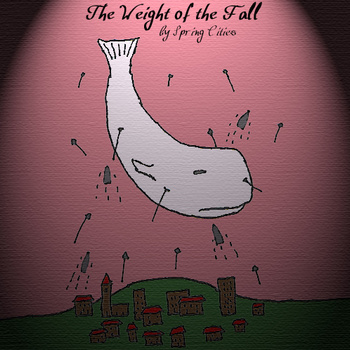Sometimes it can take a tragic happening in your life for you to hear a song differently. Not that anything dramatic has happened directly to me recently, but as I stared outside my living room window realising the hollow and sad fact that is life (as pretentiously cinematic as that does sound) I suddenly managed to put it all aside and just get by and live on for the meantime. And why? As I stood there I had Spring Cities’ “Deer” playing in my ears. Through the upbeat instrumentation I had already warmed to, the line “I keep telling myself there’s nothing going on” suddenly took on a clearer meaning. Something might have upset you at work or your girlfriend might be particularly cold to you at the moment, but it’s surprisingly easy to let that all be a distant thought when you take the line seriously. It’s a sort of optimistic ignorance that works if you can’t be bothered spiraling into a depressed mood that will probably linger uselessly for a few days.
This is only temporary though – you can’t avoid those half-empty days as much as you try. And that’s how The Weight of the Fall turns out. Stephen West, the man behind the Spring Cities moniker, says this album is about disillusion and admits to it being a somewhat depressing record. And it’s good that he’s deprecatingly honest about his work, especially since that’s exactly what the record is. The majority of the songs here are lingering, meandering even, with West on guitar singing and strumming inoffensively. Sometimes this isn’t at all bad: opener “Native” sets the mood correctly as the guitar notes hint at a sort of optimism amidst lyrics of not being able to talk, while instrumental “Jawbones” goes by at a steady pace, guitar notes played considerately as the sound of some far-away traffic plays in the background (think perhaps Yo La Tengo doing a slow and gentler version of Radiohead’s “Hunting Bears”).
But the other songs of these similar qualities, particularly those filling up the second half of the album, don’t make for particularly engaging listening experiences. “I Am A Disciple” has little more than a held string note and some dramatic pauses added in for effect, while “Worry, Pt. 1” has the storm happening in the background as drums and piano build carefully. But the actual content of the songs themselves isn’t strong or interesting enough to make the added effects worth anything. West’s lyrical content often falters on being vague and undramatic, not making for memorable or quotable lines when you try to remember the elements of the songs.
However, when the material lifts its spirits, it makes returning a pleasure. Aforementioned “Deer” doesn’t even hit the three-minute mark, but it manages to build chirpy guitars, piano and scuffling drums perfectly so that the end result is a near-perfect pop tune, even if the lyrical content is rather demoralizing: “There once was a God but now it’s gone/ Everyone is alone here.” Brief but rather bouncy “Tired Bones And Hearts” keeps the material simple with little more than a melodica and a jaunty melody bobbing it along. “Glass,” on the other hand, mixes the two sides of the coin as it sprinkles a glockenspiel over a now somewhat signature strumming and singing, making for middle ground; it’s enjoyable in the context of the rest of the album or on its own, but only if you’re really in the right mood.
Even though the overall score given would perhaps suggest against it, The Weight of the Fall isn’t a bad album at all. The score feels unrepresentative, but it’s more honest – any higher and I feel like I’m being sympathetically generous. Considering the subject matter, the album is a cohesive execution that can be enjoyable when the right mood is present or taken in small doses with a more buoyant disposition. But as said, the album sadly finds itself meandering too often, taking pauses that don’t hold me on the edge of my seat and rarely come back into focus with something engaging. The best moment for this though is when “Worry, Pt. 2” begins and the guitars let rip, drums following suit and crashing along. I even think I can hear West screaming in the background. It makes for a near-awesome release that echoes a moment like one played by The Twilight Sad. The album needs it, as does West by the sounds of it. He could do well to let rip more often instead of feeling compelled to dwell in the drearier and ambling side of life. Sometimes a little optimism can go a long way.

